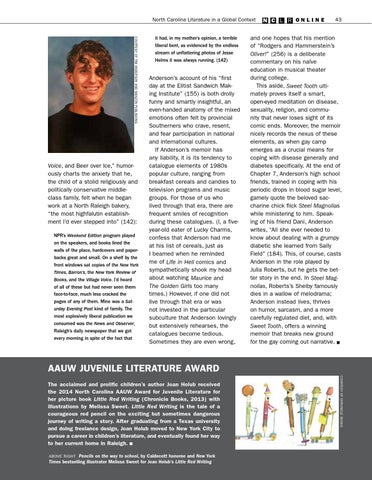North Carolina Literature in a Global Context
COURTESY OF TIM ANDERSON AND AMAZON PUBLISHING
Voice, and Beer over Ice,” humorously charts the anxiety that he, the child of a stolid religiously and politically conservative middleclass family, felt when he began work at a North Raleigh bakery, “the most highfalutin establishment I’d ever stepped into” (142): NPR’s Weekend Edition program played on the speakers, and books lined the walls of the place, hardcovers and paperbacks great and small. On a shelf by the front windows sat copies of the New York Times, Barron’s, the New York Review of Books, and the Village Voice. I’d heard of all of these but had never seen them face-to-face, much less cracked the pages of any of them. Mine was a Saturday Evening Post kind of family. The most explosively liberal publication we consumed was the News and Observer, Raleigh’s daily newspaper that we got every morning in spite of the fact that
it had, in my mother’s opinion, a terrible liberal bent, as evidenced by the endless stream of unflattering photos of Jesse Helms it was always running. (142)
Anderson’s account of his “first day at the Elitist Sandwich Making Institute” (155) is both drolly funny and smartly insightful, an even-handed anatomy of the mixed emotions often felt by provincial Southerners who crave, resent, and fear participation in national and international cultures. If Anderson’s memoir has any liability, it is its tendency to catalogue elements of 1980s popular culture, ranging from breakfast cereals and candies to television programs and music groups. For those of us who lived through that era, there are frequent smiles of recognition during these catalogues. (I, a fiveyear-old eater of Lucky Charms, confess that Anderson had me at his list of cereals, just as I beamed when he reminded me of Life in Hell comics and sympathetically shook my head about watching Maurice and The Golden Girls too many times.) However, if one did not live through that era or was not invested in the particular subculture that Anderson lovingly but extensively rehearses, the catalogues become tedious. Sometimes they are even wrong,
N C L R ONLINE
43
and one hopes that his mention of “Rodgers and Hammerstein’s Oliver!” (256) is a deliberate commentary on his naïve education in musical theater during college. This aside, Sweet Tooth ultimately proves itself a smart, open-eyed meditation on disease, sexuality, religion, and community that never loses sight of its comic ends. Moreover, the memoir nicely records the nexus of these elements, as when gay camp emerges as a crucial means for coping with disease generally and diabetes specifically. At the end of Chapter 7, Anderson’s high school friends, trained in coping with his periodic drops in blood sugar level, gamely quote the beloved saccharine chick flick Steel Magnolias while ministering to him. Speaking of his friend Dani, Anderson writes, “All she ever needed to know about dealing with a grumpy diabetic she learned from Sally Field” (184). This, of course, casts Anderson in the role played by Julia Roberts, but he gets the better story in the end. In Steel Magnolias, Roberts’s Shelby famously dies in a wallow of melodrama; Anderson instead lives, thrives on humor, sarcasm, and a more carefully regulated diet, and, with Sweet Tooth, offers a winning memoir that breaks new ground for the gay coming out narrative. n
AAUW JUVENILE LITERATURE AWARD
ABOVE RIGHT Pencils on the way to school, by Caldecott honoree and New York
Times bestselling illustrator Melissa Sweet for Joan Holub’s Little Red Writing
COURTESY OF CHRONICLE BOOKS
The acclaimed and prolific children’s author Joan Holub received the 2014 North Carolina AAUW Award for Juvenile Literature for her picture book Little Red Writing (Chronicle Books, 2013) with illustrations by Melissa Sweet. Little Red Writing is the tale of a courageous red pencil on the exciting but sometimes dangerous journey of writing a story. After graduating from a Texas university and doing freelance design, Joan Holub moved to New York City to pursue a career in children’s literature, and eventually found her way to her current home in Raleigh. n
